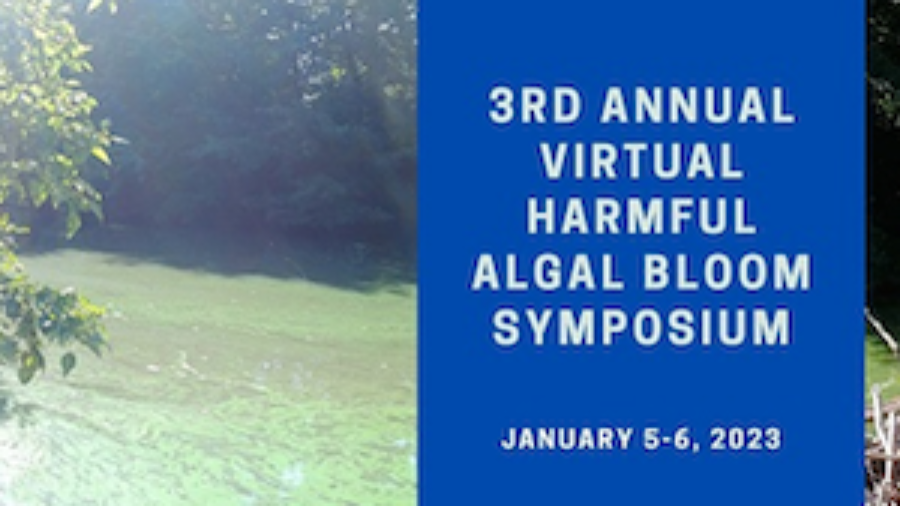This edition of the Algal Bloom Action Team will feature Ellen Preece, Senior Scientist for the California Department of Water Resources. Dr. Preece will share her research monitoring microcystin from 2020 to 2023, which spanned California’s driest consecutive 3-year period and one of the wettest years on record (2023).
Save the Date! The University of Illinois System and São Paulo Research Foundation Hosting FAPESP Week in Chicago, Register By 3/28/24
The University of Illinois System and São Paulo Research Foundation (FAPESP) have the pleasure of inviting you to attend FAPESP Week Illinois on the 9th and 10th of April 2024 at the University of Illinois Discovery Partners Institute.
Upcoming Algal Bloom Action Team Webinar
Tune into the first Algal Bloom Action Team Webinar of the year! This webinar will feature two presentations – Jen Wisecaver, Associate Professor at Purdue University, who will discuss extreme diversity and cryptic species in Prymnesium parvum and Barry Rosen, Professor at Florida Gulf Coast University, who will discuss the secrets of freshwater cyanobacteria blooms.
4th Annual Harmful Algal Bloom Symposium Videos Out Now
The North Central Region Water Network (NCRWN) hosted the 4th Annual Harmful Algal Bloom Symposium on January 4th, and you can watch the recordings here!
Check out these videos, as well as more recordings from previous events, on NCRWN’s YouTube Channel.
City of Urbana Pumpkin Smash Event November 4th at the Landscape Recycling Center
The city of Urbana is hosting a Pumpkin Smash event at the Landscape Recycling center on Saturday, November 4th from 11 am to 3 pm. This is a free event to bring your old October gourds to the food compost pile and smash them up, while learning about local compost and organics recycling!
UIUC’s Students for Environmental Concerns (SECS) group is also going to set up pumpkin collecting stations around campus at FAR/PAR, Channing Murray, Ikenberry Commons, and Grainger Library and collect pumpkins on November 4th from 10 am – 2 pm. If you’re a student who has a pumpkin to get rid of but can’t personally get to the Landscape Recycling Center, you can drop it off at one of these pumpkin collecting stations.
- Where: Urbana Landscape Recycling Center, 1210 E University Ave, Urbana, IL
- When: Saturday, November 4th, 11 pm – 3 pm
- Learn more: Pumpkin Smash at Landscape Recycling Center
Algal Bloom Action Team Symposium Call for Proposals – Submit by November 17th
The Algal Bloom Action Team invites you to submit an abstract to the Fourth Annual Harmful Algal Bloom Virtual Symposium by October 30th
Upcoming Algal Blooms Action Team Webinar: Wed. February 1, 2023 at 11 AM CT
 Upcoming Webinar: Upcoming Webinar:Toxins Associated with Fresh Water Harmful Algal Blooms and Their Mammalian Health Effects Wednesday February 1, 2023 11:00 AM CT/ 12:00 PM ET  |
The Algal Bloom Action Team is hosting its first webinar of 2023 on Wednesday, February 1st. This webinar will feature Donna Hill with the Office of Research and Development with the US EPA. Hill will provide an overview of health effects seen in humans and animals from freshwater cyanotoxin blooms. Completed and planned cyanotoxin research in their EPA lab will also be outlined.
The Algal Bloom Action Team is a collaboration of water professionals, researchers, and educators from the national network of Water Resources Research Institutes, the North Central Region Water Network, and Cooperative Extensions from the 12 states in the North Central Region of the United States. More information at northcentralwater.org/habs/.
Copyright © 2023 North Central Region Water Network, All rights reserved.
Harmful Algal Bloom Symposium Recap – View slides for the 4 sessions!
The Algal Bloom Action Team’s popular Virtual Harmful Algal Bloom Research Symposium returned for its third year on January 5-6, 2023.
The event brought together over 800 water professionals from across the North Central Region to hear about the latest harmful algal bloom Research, discuss examples of effective bloom management, and learn about the latest technologies being used to tackle this global issue
View the recordings of the symposium:
- Session 1: Harmful Algal Bloom Monitoring and Forecasting
- Session 2: Harmful Algal Bloom Detection and Treatment
- Sessions 3 & 4: Ecology and Human Health and Case Studies
View an abbreviated version of the agenda below or find a more detailed PDF here.
NGWA Webinar: Hydrogeology of Illinois
Join NGWA on October 25th to explore the Hydrogeology of Illinois. As hydrogeology varies widely across the United States — and as primary jurisdiction over groundwater development rests with the states — each is unique. This webinar series explores the issues encountered in each of the 50 states — one at a time.
Explore your region with Daniel Hadley, PG and hydrogeologist at the Illinois State Water Survey, who will discuss the unique hydrogeology of Illinois, including:
- A rapidly declining aquifer system in the Chicagoland area
- The impact of a billion gallons a day of irrigation withdraws in the “Imperial Valley” of the Midwest
- And how groundwater could shut down interstate travel in a matter of minutes
The 1-hour Illinois hydrogeology webinar focuses on the state’s:
- Major aquifers
- Physical and geologic properties
- Groundwater use and availability
- Groundwater quality and contamination
- Surface water/groundwater interactions
- Groundwater management issues
Who should attend?
- Geologists
- Hydrogeologists
- Hydrologists
- Water well drilling contractors
- Land-use planners
- Federal, state, and local regulatory personnel
- Water-supply managers
Webinar Details: Link to details and registration
October 25th at 12pET/11aCT
Early Registration Pricing: $29 on or before October 14th

